- Home
- Tim Tingle
Danny Blackgoat, Navajo Prisoner Page 2
Danny Blackgoat, Navajo Prisoner Read online
Page 2
Before he climbed from the wagon, Danny waited. When he heard nothing, he put first one foot, then the other, to the ground. When he was sure he was alone, Danny ran to the creek. He filled the tin cup with water.
He carried the water to the old woman. She was curled up in a blanket, as tiny as a child.
“Here,” he whispered. “I brought you a drink.”
The old woman woke up slowly. She batted her eyes and turned her head. She looked at the moon, then turned to look at Danny.
“For me?” she asked.
“Yes, but we must be quiet. The soldiers don’t know.”
The woman nodded her head. She took the cup in her wrinkled fingers. She closed her eyes and sipped the water. When the cup was empty, she smiled at Danny.
“Ahéhé, thank you,” she whispered.
“You are welcome,” said Danny. As he crawled to his blanket, Danny felt good about himself. For the first time since the soldiers came, he felt good and strong.
“Respect the old people,” he thought. He fell asleep remembering the words of his grandmother: “Respect the old people.”
Day after day the Navajo people walked. And every day Danny watched for his chance to escape.
“Danny,” his grandfather said, “you are young and eager to be free. But remember what you have seen already. You saw what happened when Mr. Begay tried to run. The soldiers shot him.”
“I’ll be careful, Grandfather,” Danny said.
“What do you plan to do?”
“Every day the waterman comes in the morning. Then we don’t see another soldier for two hours at least,” Danny explained.
“If you try to run, they’ll see you,” his grandfather replied.
“I won’t run across the desert,” said Danny. “I’ll wait till we pass a canyon. When no soldier is watching, I will roll down the canyon wall. I’ll hide in a clump of cactus till everyone has passed.”
His grandfather gripped Danny’s hand. He handed him a stone arrowhead and said, “Keep this with you, Danny. It will protect you.”
“Ahéhé, thank you,” Danny said.
The days were hard for Danny, but nights were even worse. For the evening meal the people sat crossed-legged, leaning against each other for support. A soldier spooned hot bean soup into their hungry mouths, three spoons per person.
As he tasted the soup, Danny’s tongue and throat burned. He felt the hot liquid flow to his stomach. He always kept the last spoonful in his mouth for several minutes, rolling it over and over with his tongue until all the flavor was gone.
At night everyone slept close together, still tied at the wrists. The desert ground was covered with crawling insects, some poisonous. Although his hands were free, Danny could not slap away the spiders and insects that crossed his chest and face.
“If the soldiers see me slapping a spider, they’ll know my hands are free,” he thought.
Every evening the soldiers settled into their tents. Only a handful of guards watched over the Navajos. Danny lay very still while insects crawled over him.
One night a large scorpion, his tail held high, crept slowly across the sleeve of Danny’s shirt, from his wrist to his shoulder. When the scorpion came to Danny’s collar, it gave a little leap and landed on Danny’s neck. Danny held his breath as he watched the scorpion climb across his cheek and onto his nose.
From the tip of Danny’s nose, it waved its tail like a signal flag. The scorpion walked slowly across his lips as Danny watched, still not breathing. When the scorpion leaped onto his chest, Danny opened his mouth wide. His belly heaved as he gulped in the cool desert air.
When the scorpion finally stung him on the ribs, Danny Blackgoat quietly laughed with relief.
“Anything,” he thought, “is better than suffocating!”
The next morning Danny awoke with a stabbing pain from the scorpion sting. Sunrise was still an hour away. He remembered how the scorpion perched atop his nose and waved his tail like a flag.
“My little friend was telling me it is time to escape,” Danny told himself. “Yes, today will be the day!”
Bread and water were served at daylight. The Navajo people stood as the waterman and two soldiers rode up and down the line.
“Drink!” the soldiers shouted.
If anyone took too long swallowing the water, the soldier tossed his bread to the ground and stomped it in the dirt.
Danny took his cup carefully, keeping the rope around his wrists. The water cooled his dry and swelling lips. As the soldier moved away from him, Danny loosened the rope.
With breakfast over, the marching began. Danny kept a keen eye out for the soldiers. He waited and watched. An hour later the road curved by a shallow canyon. Clumps of bushes grew on the canyon walls.
“Good hiding places,” Danny thought. He stood tall and looked as far as he could see, to the front and to the rear of the line.
“No soldiers in sight,” he told himself. “Now’s the time!”
He threw off the rope from his wrists and ducked under it. His heart was pounding. He knew he must act quickly. Leaping away from the line of marchers, he dashed to the canyon.
He rolled down the steep incline. After fifty feet, he tumbled into a clump of cactus. The cactus spines stuck through his shirt and pants. He winced in pain but stayed quiet. He curled into a tiny ball, hidden from the road by thick green cactus pads.
Everyone saw Danny escape. Everyone but the soldiers, that is. The Navajo walkers had watched him for days, freeing himself of his knots. They knew what they must do.
With their heads bowed to the ground, they moved closer together. They closed the gap in the line.
At the bottom of the canyon, Danny lay as still as a stone. He listened to the passing wagon wheels creak and groan above him. He froze when a soldier shouted, fearing that his tracks had been seen. Too scared to move, his heart pounded in his chest.
“I hope the soldiers can’t hear my heartbeat,” he thought.
Danny lay in the shadows of the cactus for half an hour. He heard nothing—no horses neighing or people talking, no wagons creaking. He sat up and felt the cactus thorns. Hundreds of sharp thorns were stuck into his pants legs and the back of his shirt. He began to pick out the thorns.
Suddenly his eyes caught the movement of a shadow on the ground. At first he thought a buzzard must have spotted him.
“He’s flying low to see if I’m dead.”
Danny lifted his gaze in time to see a rifle butt coming in his direction. He raised his hands, but the soldier with the rifle was powerful and quick. The rifle butt struck him on the cheek. He fell to the ground, unconscious.
Chapter 4
Burning Saddle
When Danny awoke the next morning, his cheeks were swollen and blue. His eyes wouldn’t open. His face was covered in dark dried blood.
Danny felt a gun barrel strike his ribs. He rubbed his eyes and looked up to see a rifle pointed at his chest. He lay on his back surrounded by soldiers.
“That’s one fiery-eyed Navajo,” the soldier said. He laughed and poked Danny again in the rib cage.
The nickname stuck. From that day forward, Danny Blackgoat was known to the soldiers as Fire Eye.
“We should make an example of him, just like we did to that old man,” said a young cavalry officer. “Every Navajo needs to know we’ll shoot ’em if they run.”
“We can hang him,” said another. “It’s hard to cause trouble from the end of a rope.”
Long minutes of silence passed. Though he couldn’t understand a single word, Danny knew his life was in danger. The excitement was over and the soldiers were deciding if he would live or die.
The scorpion sting and cactus needles sent jolts of pain through Danny’s body, pain like he never felt before. His face throbbed. But worst of all, Danny Blackgoat felt helpless for the first time in his life.
A strong voice cut the silence: “There is one way to handle a troublemaker that never fails.”
The
speaker was a captain, with hard blue eyes and a trim white beard.
“Humiliation is worse than death,” he went on. “We can chain this Fire Eye boy and drape him over a horse. Tie him like a saddle and parade him in front of the others.”
The soldiers nodded in agreement. Danny felt another stab of the rifle barrel to his ribs.
“Hear that, Fire Eye? You’re gonna get to ride a horse!”
Two soldiers dragged Danny away from the camp while another brought the horse.
“Remove the saddle!” shouted the captain. “Bring the handcuffs and a rope!”
He ripped Danny’s shirt from his back and tied it around his neck. Then Danny was handcuffed and stretched over the horse. A soldier yanked hard on his wrists.
“Oooow!” Danny shouted.
“Give me your rifle,” the captain ordered the soldier.
He gripped the rifle by the barrel and slammed the rifle butt hard on Danny’s back.
“Not one word out of you, Fire Eye,” he whispered in a mean, quiet vice. “You are lucky to be alive.”
The soldiers wrapped Danny over the horse like a saddle. They tied his hands to his feet. His shirt waved like a flag for everyone to see. His back faced the sky and the hot rays of the desert sun.
“All right, time to march!” the captain said as he climbed on his horse.
They rode to their places for the day’s walk.
“Here,” said the captain, “I’ll take Fire Eye. We have a visit to make.”
He took the reins and turned his horse to the rear of the line.
“You say his family is near the end?” the captain asked.
“Yes, sir, behind the food wagon,” a soldier replied, pointing to Danny’s family.
“Fine,” said the captain. “They need to know their boy is still alive.”
He rode in a slow gallop, making sure everyone saw his captive. When he heard a woman cry out, he smiled.
“I think we’ve found your family, Fire Eye.”
Danny knew his mother’s voice. He lifted his head and shouted, “I am all right, mother!”
The captain pounded his fist on the back of Danny’s head.
“Did I say you could talk?” He yanked the shirt like a noose and lifted Danny’s face. “Go ahead, Fire Eye, let them get a good look at you.”
Danny’s father wrapped his arms around his mother and sister. He held them close while his grandfather whispered a prayer.
Danny dropped his head and closed his eyes. He felt a deep sorrow for bringing so much grief to his family. The captain jerked the reins and rode to the front of the walkers.
For the remainder of the day, Danny was paraded up and down the line. The soldiers took turns leading his horse. Once in the morning and once more in the afternoon the waterman let him sip from the cup.
“Just enough to keep him alive,” said the captain. “Fire Eye is worth more to us alive than dead. But if he does die, we’ll parade his body for a few days, then let them walk over it. Same with the bread. Give him just enough to keep him alive.”
By noon on the second day, blisters formed on Danny’s back. When the blisters popped, flies crawled over the wounds. Soon a buzzard spotted Danny, covered in flies. Five black birds of death swooped down to get a closer look.
Every day, as the bugle sounded, Danny was led from one end of the line to the other. At the campfire each night, the captain bragged about his plan.
“What did I tell you?” he said. “Since we saddled Fire Eye and let them all get a look, nobody has tried to escape.”
“Next time we don’t have to wait,” said a soldier. “Just find a young Injun and make a saddle out of ’em.”
The others laughed.
Danny never knew how many days he had been strapped to the horse. He almost died from thirst. He grew so thin his mother hid her eyes and cried when she saw him. His skin bled from the blisters and his body swelled.
As the Long Walk of the Navajos neared Bosque Redondo and Fort Sumner, Danny was more asleep than awake. Though his body ached and throbbed, his dreams were of the past.
In his dreams, he walked his sheep to the far end of the canyon. He watched them drink the cool spring waters and graze on the grasses. He felt a cool breeze on his cheeks and was glad to be Navajo.
Chapter 5
No Home for Troublemaker
“Take no chance with that boy!” shouted an officer as the Navajo walkers entered the gates of Fort Sumner. “He’s a troublemaker! Get the chains.”
Two soldiers surrounded Danny. They tied one set of chains to his feet and another set to Danny’s wrists. They dragged him from the horse.
Danny was so thin and weak. He lay as limp as a rag, unmoving. For two weeks he had eaten very little, barely a cup of beans in the morning and another at night.
“Bring him to the jail!” shouted the officer.
Danny kept his eyes closed, as he had learned to do. He wanted the soldiers to forget he was a living person.
“It is safer that way,” he thought. “Someday they will leave me alone just long enough. Then I will escape.”
The soldiers dragged Danny to a small building with bars on the windows. The officer banged his fist on the wooden door.
“We have a prisoner for you!” he shouted.
The door opened and a scruffy, gray- haired man in civilian clothes stepped out.
“I don’t think so,” the old man said, spitting a wad of chewing tobacco at the officer’s feet. “You think just because we have all these Indians roaming around the fort that I got to have one living in the same house as me?”
“This ain’t no house,” said the officer. “It’s a jail. This boy is a troublemaker. He belongs in jail.”
“It might be just a jail to you, but I live here,” the old jailer replied. “And I’m not gonna have no Indian stinking up my house.”
“What should I do with him?” asked the officer.
“Do what we should have done with every one of these savages. Take him out in the desert and shoot him. Let the buzzards fight over his bones,” he said, stepping inside and slamming the door.
Danny heard every word. He saw the jailer look at him and spit on the ground. He saw the snarl on his face, the hatred in his eyes.
He wanted to drive his elbow into the stomach of the soldier holding him. He wanted to fling the chains against the face of the officer. And when he fell to the ground, he wanted to stomp him.
“Now is not the time,” he told himself. “If I try anything, they will shoot me. They’ll drag my bleeding body to my family. I have to stay in control.”
Danny took a deep breath and didn’t move a muscle. The jailer opened the door again.
“There’s a wagon leaving soon for Fort Davis, over in Texas,” he said. “They keep Rebel prisoners there. They’ll take him. They’ve got plenty of guards. And they make ’em work in the fields all day. From what I hear, they bury several prisoners a week. No troublemaker leaves there alive.”
“Thanks for tip,” said the officer.
“But I still think it’d be less trouble for everybody if you just shot him now,” the jailer said. “If you do, drag him outside the fort. I don’t want any blood on my doorstep.”
Less than an hour later, Danny was tossed in the back of a covered wagon.
“Bring him to Fort Davis,” said the officer. “His name is Fire Eye. And I’m warning you, he’s nothing but trouble.”
“Hey, wait a minute,” shouted the wagon driver. “That boy smells awful. If he’s riding with me, get him some clean clothes.”
The soldiers appeared with a baggy white shirt and worn blue soldier’s pants. They dressed him and lifted him into the wagon. Danny rolled to a corner and leaned against the wall, with his knees tucked under him.
“Hey-yo, giddyap!” shouted the driver. The mules leaped forward, the wagon shook, and Danny fell flat on his face. He lay still for a moment and felt the pain flow through him.
“That was dumb,” he sa
id to himself. “I can sit smarter than that.”
He wriggled himself upright and stretched his legs forward. For the next several hours, though the wagon jumped and rattled, Danny felt more alive than he had felt since the soldiers arrived.
He closed his eyes. In his imagination he saw the smoke rising from the cornfields. He heard the cries of his sheep as the soldier cut their throats. He saw the look on his mother’s face as the soldiers took him away.
“I will see you again,” he said. “Someday.”
At noon on the first day, the driver pulled the wagon by the roadside. He dragged Danny to the rear of the wagon and lifted him to his feet.
“Go ahead there, boy, sit down,” he said, pointing a rifle at Danny. “Time for lunch.”
The driver seemed to like having someone to talk to, even though he knew Danny didn’t understand anything he said.
“I’m keeping your leg chains on,” he said, “but ain’t no need for your hands to be tied. You ain’t goin’ nowhere.”
He loosened Danny’s wrist chains and tossed them in the wagon. Danny rubbed his wrists and nodded at the driver. He still couldn’t look him in the eyes.
The driver was nice to him, nicer than any white man had ever been. But he was still white, like the soldier who shot Mr. Begay, and Danny didn’t trust him.
“I hope you like dried beef,” the driver said. “That’s all we got for now.” He handed Danny two thick slices of dried beef.
Danny took his first bite and almost spit it out. The beef was as hard as tree bark. But a sweet, warm taste soon filled his mouth.
Danny nodded a “thank you” to the driver. He bit down on the beef and ate his first meal ever with a white man.
That night, and every night for the next week, the driver made a campfire. He cooked a small pot of beans in boiling water.
“Just beans; ain’t got no meat,” he said, handing a bowl to Danny.
The days crawled by as slowly as a sleepy turtle. Danny sang Navajo songs to himself. He thought of his family and prayed for their safety.

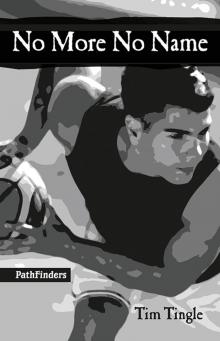 No More No Name
No More No Name Trust Your Name
Trust Your Name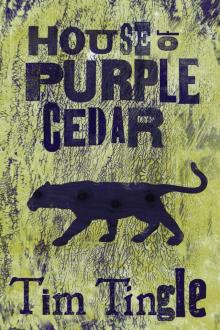 House of Purple Cedar
House of Purple Cedar NO-NAME
NO-NAME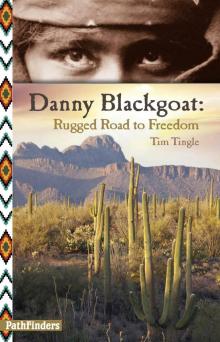 Danny Blackgoat: Rugged Road to Freedom
Danny Blackgoat: Rugged Road to Freedom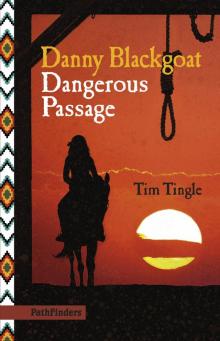 Danny Blackgoat
Danny Blackgoat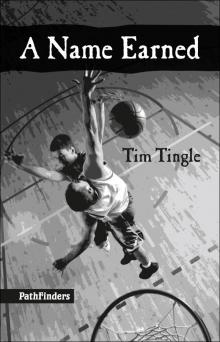 A Name Earned
A Name Earned Letter to Belinda
Letter to Belinda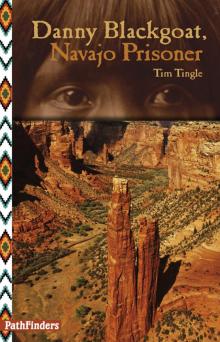 Danny Blackgoat, Navajo Prisoner
Danny Blackgoat, Navajo Prisoner